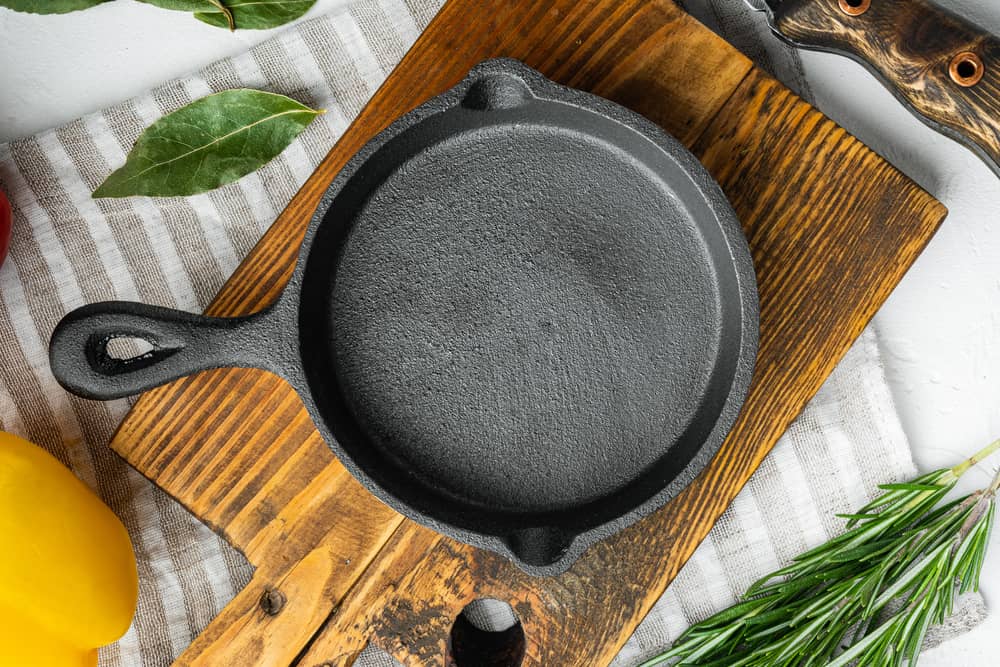Anyone who has ever cooked with a cast iron skillet knows they are incredibly versatile and durable pieces of cookware. Whether you use it to cook up a big batch of fried chicken or just a simple grilled cheese sandwich, it always gets the job done. But even the toughest pan can show signs of wear and tear if it’s not properly cared for.
Don’t worry, though! Cleaning your cast iron pan is easy and only takes a few minutes. Just follow these simple steps, and you’ll have no trouble getting your pan clean every time you use it.
How to Clean a Cast Iron Pan
You will need:
- Baking soda
- Coarse salt
- Clean paper towels or dishcloths
- A non-abrasive sponge or scrub pad
- A soft, non-metal brush
Step 1: Rinse out the cast iron pan with hot water
As soon as you’re done cooking, rinse your pan out with hot water. This will help loosen any stuck-on food bits and make them easier to remove later on. Don’t use soap at this point, as it can strip the seasoning from your pan.
Step 2: Scrub the cast iron pan with a stiff brush
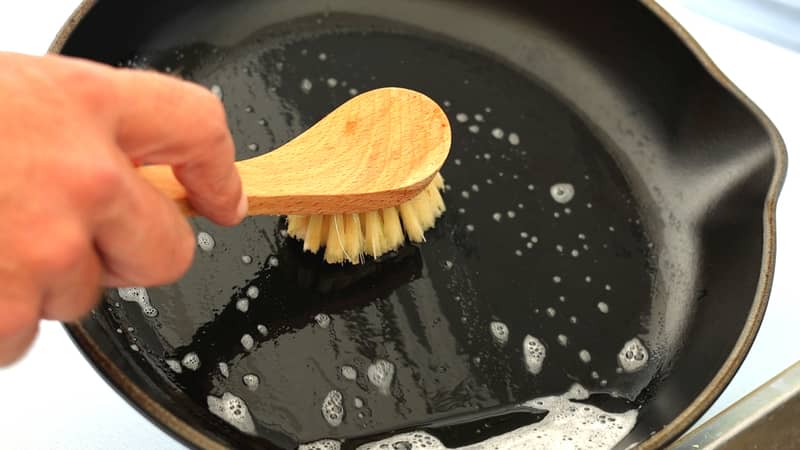
Once you’ve rinsed it out, use a non-abrasive sponge to scrub away any remaining food residue. If there are any particularly stubborn spots, you can sprinkle a bit of coarse salt on them and scrub them with the salt before rinsing everything off again.
Step 3: Dry the cast iron pan completely
Make sure you dry your pan thoroughly after washing it; otherwise, it may rust. The best way to do this is to set it on the stove over low heat for a few minutes until all the water has evaporated.
Step 4: Season the cast iron pan with oil
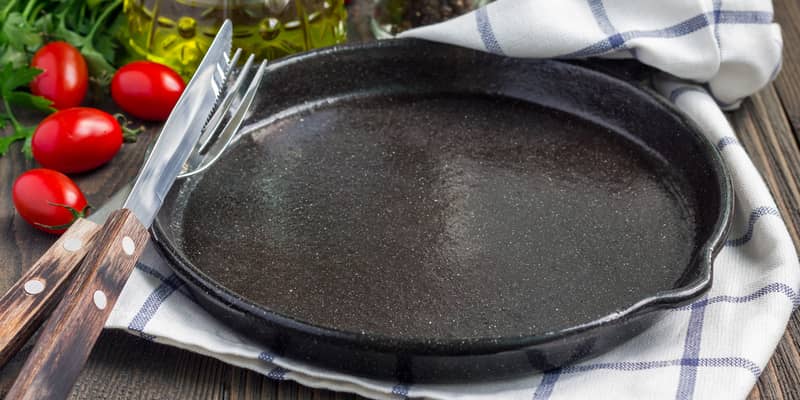
Once your pan is dry, rub a light layer of vegetable oil or flaxseed oil all over the surface of the metal using a paper towel or clean cloth. This will help keep rust at bay and keep your pan performing at its best.
Step 5: Store the cast iron pan in a dry place
To prevent rusting, make sure you store your cast iron pan in a dry place when you’re not using it — ideally in a cupboard or cabinet where air can circulate freely around it.
How to Remove Rust from Cast Iron Pans
No matter how well you take care of your cast iron pan, eventually, rust will happen. Rust results from the iron in the pan oxidising when it comes into contact with water.
What you’ll need:
- 1 tablespoon salt
- 1 tablespoon cooking oil
- A non-abrasive scrub pad or brush
- White vinegar
- Baking soda
- Paper towels or a clean dishcloth
Step 1: Soak the cast iron pan in white vinegar
The first step is to soak the pan in vinegar for about an hour. This will help loosen the rust so that it’s easier to remove. You can mix white vinegar with equal parts water in a bucket or a basin. Just make sure that the pan is completely submerged in the vinegar solution.
Step 2: Scrub the cast iron pan with baking soda
After the pan has soaked in vinegar for an hour, it’s time to start scrubbing. Pour a generous amount of baking soda into the pan and begin scrubbing with a non-abrasive sponge or brush. The baking soda will help lift the rust off of the surface of the pan. Be sure to scrub all sides of the pan, including the bottom and sides.
Step 3: Rinse and dry thoroughly
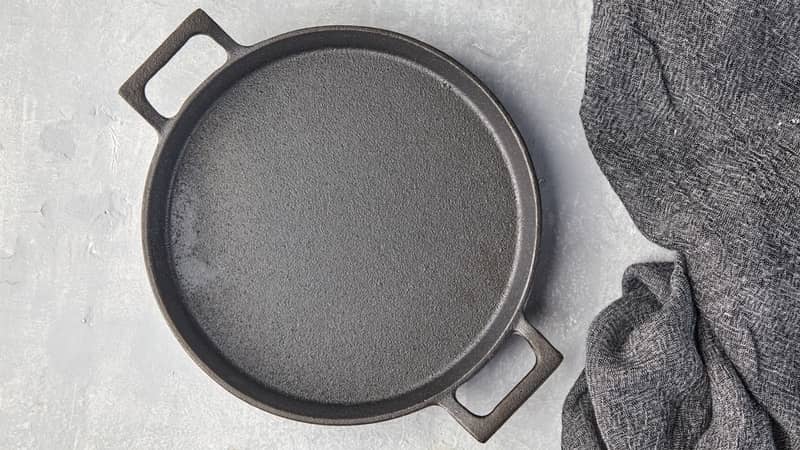
Once you’ve finished scrubbing, rinse the pan off with hot water. Make sure that you rinse all the baking soda off; otherwise, it will corrode the surface of your pan. After rinsing, dry your pan thoroughly with a clean dishcloth.
Step 4: Season your cast iron pan
Now that your pan is clean and free of rust, it’s time to season it! Seasoning your pan helps prevent rust in the future and makes it non-stick.
Caring For Your Cast Iron Cookware
Once you’ve cleaned and seasoned your cast iron pan, it’s important to take care of it so that it lasts for years. Here are a few dos and don’ts to follow:
How to care for your cast iron cookware
Dry your cast iron cookware thoroughly
It’s important to dry your cast iron thoroughly after each use and before storing it. If water is left on the surface of the cookware, it can cause rusting. To dry your cookware properly, simply wipe it down with a clean dishcloth. You can also place it on a stovetop burner set to low heat until any remaining water evaporates.
Store your cast iron pan in a dry place
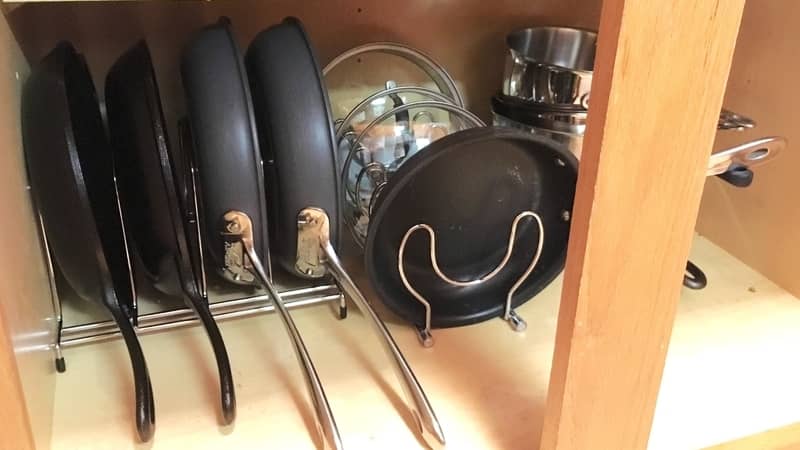
While cast iron cookware is incredibly durable, it requires some special care in order to keep it in good condition. One of the most important things to remember is to always store it in a dry place. This is because cast iron is prone to rust, and even a small amount of moisture can cause it to start to degrade.
Season your cast iron cookware regularly
Seasoning helps to create a non-stick surface on your cookware. This is because the fats and oils in the seasoning help to fill in the pores of the cast iron, creating a smooth surface that food can’t easily adhere to. The seasoning process also helps to prevent rust and corrosion. Over time, the seasoning will form a tough barrier that will protect the cast iron beneath it from moisture and oxygen.
What not to do with cast iron cookware
Don’t use soap on cast iron (unless absolutely necessary)
While soap is great for cleaning most things, it will strip the seasoning from your cast iron pan and leave it vulnerable to rust. Instead, simply rinse your pan with hot water after use. If you do need to wash it with soap, use mild dish soap and make sure to re-season the pan afterwards.
Don’t soak cast iron cookware in water
Soaking cast iron cookware in water can cause it to rust, so it’s best to avoid letting your pan sit in water for too long. If there are stubborn stuck-on bits, make a paste out of baking soda and water and use that to scrub the area clean.
Don’t put your cast iron cookware in the dishwasher
The harsh detergents and high temperatures in the dishwasher can damage your cast iron pan. Stick to hand-washing to keep your pan in tip-top condition.
How to Season Cast Iron Cookware
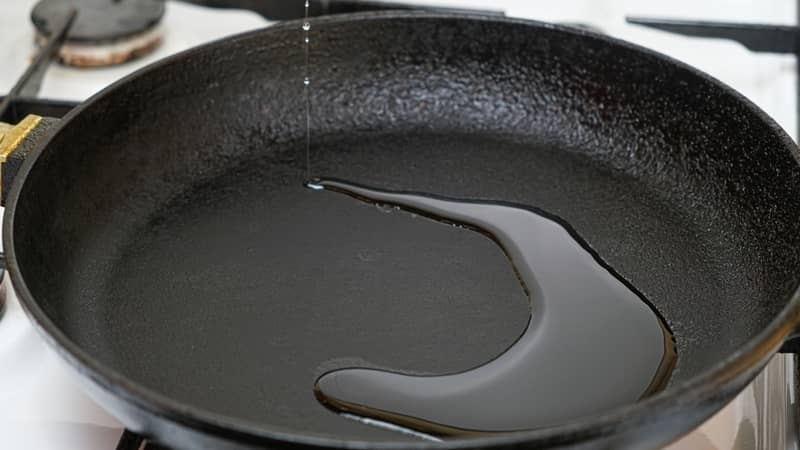
Seasoning is important because it creates a nonstick surface on the cast iron cookware and also prevents rust. When you season your pan or skillet, you’re basically creating a layer of polymerised oil that coats the surface of the metal. This layer of oil helps to protect the pan from moisture and also makes it easier to clean.
Which Oil is Best for Seasoning Cast Iron?
There are a few different oils that you can use for seasoning, but we recommend using either vegetable oil or flaxseed oil. Both oils have high smoke points, which means that they can withstand high temperatures without burning. This is important because you want to heat the oil until it starts to smoke in order to create the nonstick coating.
How to Season Your Cast Iron Pan
- Preheat your oven to 200 degrees Celsius.
- Pour about 1/2 teaspoon of oil into your pan and use a paper towel to spread it around evenly. Make sure that you cover the entire surface of the pan in a thin layer of oil, including the sides and handles.
- Place the pan upside down on the top rack of your oven. Put a sheet of aluminium foil on the bottom rack to catch any drips.
- Turn off the oven and let the pan cool inside before removing it. Let it cool completely before wiping away any excess oil with a paper towel.
- Your cast iron pan is now ready to use.
Don’t Cast This Pan Out Of The Kitchen
The best thing about cast iron pans is that they evenly distribute heat, they’re naturally non-stick, and they last forever if you take care of them. So, while cast iron is incredibly durable and virtually indestructible, it needs extra care to stay that way. All you’ll need is some elbow grease and oil to keep your cast iron cookware in pristine condition. If you’re worried about upkeep, ask a professional cleaning service to help out.

